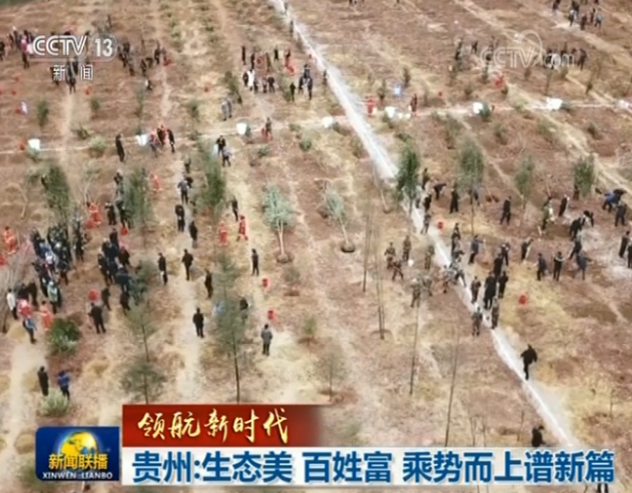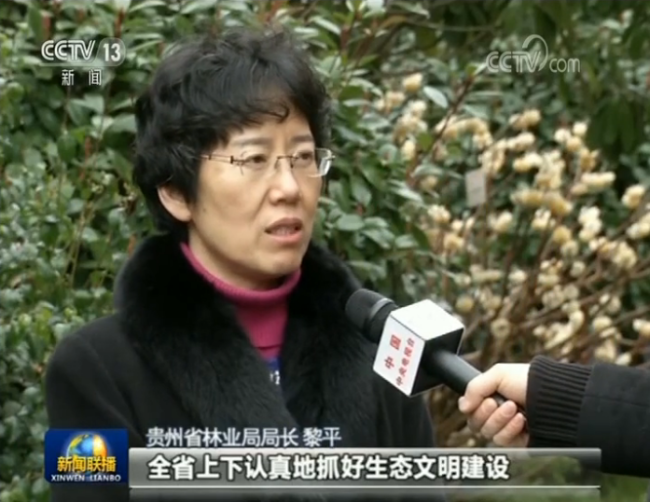Guizhou: keep protecting environment and improving people's livelihoods
Chinese President Xi Jinping made the call during deliberations in 2014 by Guizhou NPC deputies during The Second Session of the 12th National People's Congress that Guizhou Province needed to innovate, and to utilize second-mover advantages to achieve balance between ecological protection and economic development. He also said the province needed to make steady headways on poverty alleviation through economic development, so that the people in poverty-stricken areas could benefit.

At the request of President Xi Jinping, Guizhou Province sticks to the essential principles of ecological protection and economic development, carrying out large-scale ecological development and poverty reduction in a bid to create a prosperous and environmentally friendly place for people.
180 thousand cadres and common people have planted over 1.3 million saplings at sites across the province after Chinese Spring Festival. The voluntary tree planting has been ongoing for 5 years.

Li Ping, Director of Forestry Department of Guizhou Province, says the whole province, at the request of President Xi Jinping, has done well in ecological civilization construction. As a result, the annual forest coverage growth rate ranges from 1.5 to 2 percentage point.
President Xi Jinping pointed out that protecting the environment can help to preserve productivity and can help to promote greater productivity.

Chen Shaobo, director of Development and Reform Commission in Guizhou Province, said it's not worth it if wealth is earned at the cost of the environment.
In order to implement the requirements of President Xi, officers in Guizhou are trying to balance achievements and environmental preservation. The province issued an environmental preservation plan for the Wujiang River in 2015, removing the 'fish cage' culture along the river which has caused severe pollution to the nearby water. Last year, a campaign against sewage and garbage disposal was carried out in all counties and towns along the Wujing River.

Huang Yiqing, the director of the Agriculture and Rural Bureau in Kaiyang County, said that with the water in the river becoming cleaner and the mountains turning greener, the residents now can breathe clean air and literally benefit from the changes.
Right now, over 20 thousand mu of fish cages in three major rivers inside the province have all been dismantled. The fishermen influenced by the campaign have made career changes under the help of the local government. For example, fisherman Zhou Denqiang has planted over 200-mu of fruit trees on a hill and raked in over 100 thousand yuan during his first harvest.
"The road to our village has been built and the water quality of our river has been improved. We are also entitled to a national grant for reforestation. We can benefit from all of these, so there is no need to go back to the fish," said Zhou.

Clear waters and lush mountains are invaluable assets. In 2014, Guizhou Province took the lead in introducing provincial-level rules on environmental protection and setting up a court specialized for dealing with cases involving ecological damage. Also that year, the province started to ask government officials to do out-of-office auditing of natural resources and to begin to carry out compensation related to environmental damage.
Guizhou Province has endeavored to develop industries including tourism, big data and health care. At present, 40 percent of the province' economy is under the 'green' economy. During Spring Festival, Xinbao Bouyei Village in the suburbs of Guiyang received a record-high number of tourists, gaining over 17 million yuan in revenues.

"As general secretary Xi remarked on the development of Guizhou and how to develop Guizhou, he mentioned about focusing on ecology, an outstanding feature of Guizhou, and turning clear waters and lush mountains into invaluable assets. What we are going to do next is combine ecological tourism with sightseeing tourism, which will help us to form a leading industry and a distinctive product in each village," said Hua Quan, deputy head of Xinbao Village in Guiyang, Guizhou Province.
Guizhou has also made progress in the work of poverty alleviation. The most difficult thing was to relocate 1.5 million impoverished people.

Located in Beipanjiang river valley, Sanbao Yi Village has harsh living conditions with poverty as high as 77 percent of the population, and is one of the 20 most-poor villages in Guizhou. Guizhou launched a relocation project in 2016 to move all the residents in Sanbao Village to Qinglong County as a poverty reduction measure. Eighty percent of the villagers have been relocated, and the entire relocation project will be completed by June this year.
"Moving people out of the village is only one step of the whole anti-poverty plan, and we need to see how those relocated households will develop and blend into the local environment," said Xu Yuangang, head of planning division of Guizhou Ecological Emigration Bureau.
The relocation community is called Ameiqituo. The town has basic facilities including schools, hospitals and industrial parks. Relocated Sanbao countrymen can retain their rural registered permanent residence while obtaining a new urban residence permit.

"Our home has a good interior finish, equipped with all necessary electric appliances. Having moved into the town, we are going to be new citizens," said Yang Chengsen, a Sanbao villager.
By the end of last year, 4.68 million people had been lifted out of poverty in Guizhou. The province set a goal for this year to cut the number of poverty stricken people in rural areas by 1.1 million and to complete the whole relocation work as a poverty relief measure.

